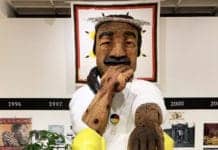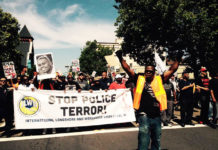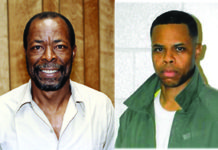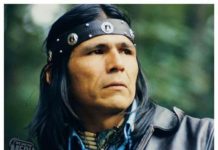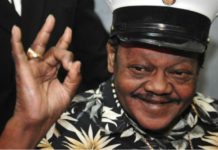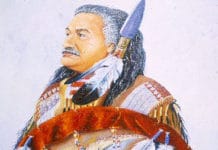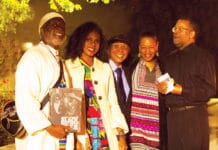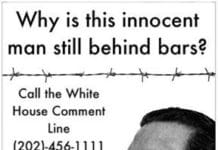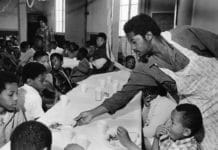by Elbert ‘Big Man’ Howard
The film by producer Stanley Nelson, entitled “The Black Panthers: Vanguard of the Revolution,” is a well-produced documentary with a specific focus. Nelson makes good use of footage of actual events and music from the era to serve as both a background and accompaniment for the main ingredient of this film – comments from a number of former Black Panther Party members, featuring mainly some of the so-called “rank and file” members. This is, in and of itself, a unique achievement, as most other films have never done this, but solely relied on interviews with the leaders.

This particular film concentrates on giving the viewer a closer look at the Black Panther Party from a particular perspective. It by no means even begins to tell the “whole story” of the Black Panther Party. No one film can do that – the Black Panther Party was the most revolutionary and progressive group of freedom fighters of modern times.
I think that Stanley Nelson produced the best film he could with the information, materials, time and money that he had to work with. He also did a good job of getting the film out there to allow as much of the public as possible the opportunity to see it.
To critics and detractors of Nelson and the film, I say this: There is indeed much more of this story to tell, including more of the vital and innovative community programs and the many accomplishments of the Black Panther Party. There are still so many of our comrades locked up in dungeons for more than three and four decades. There are still many more former Black Panther Party members who have important stories to tell, and I would encourage future filmmakers to seek information from them while they are still around.
Some of what we did: The Black Panther Party engaged and worked to solve the problems of poor and oppressed people in America and around the world. We did this through very hard work, commitment, dedication and solidarity.
We started with feeding the hungry through our free food programs; then came our free clothes and shoes programs. These programs led to more: free plumbing services, free ambulance services and free medical clinics.
We organized rent strikes to force landlords to remove lead-based paint from tenant housing. We escorted the elderly to cash their checks and to the store, etc.
We gave rides to people who needed transportation to see their loved ones in the hell-holes this government calls “prisons.” We lent support and joined the farm workers in their struggle for fair wages and working and living conditions.
The Black Panther Party engaged and worked to solve the problems of poor and oppressed people in America and around the world. We did this through very hard work, commitment, dedication and solidarity.
With the Black Panther Party newspaper as an informative tool, many in the world were educated to the evils of wars created by capitalistic and corporate greed and racist aggression against countries of people of color. We exposed the profiteers of these wars and awakened people to the fact that poor and disadvantaged youths, predominantly those of color, were the ones fighting and dying in these wars.
We fully supported the student anti-war movement against the Vietnam War and supported other movements which molded themselves after the Black Panther Party – the Brown Berets, AIM, the Young Patriots and others.

With the need for improved education, the Black Panther Party joined with students across America in demanding that Black, Asian, Latino and Native American history courses be taught in colleges and universities and that degrees be awarded in these studies. So many programs now had their beginnings stem from what we in the Black Panther Party fought for.
Taking this a step further, though, to combat the substandard education being given to poor children in public grade schools in our communities, some Black Panther Party chapters started their own community schools. These were called Liberation Schools and they were free.
So many programs now had their beginnings stem from what we in the Black Panther Party fought for.
On the international level, the Black Panther Party was followed by and interested thousands worldwide, and speakers from the BPP were sought after. Our newspaper made this possible and Minister of Culture Emory Douglas was an integral part of all of that.
His art reflected the conditions of poor and disenfranchised peoples of color here and everywhere. It spoke to people in Asia, Africa and Latin America. To this present day, Emory is in demand and travels extensively, lecturing on his art and how it reflects the world we live in.
Today’s crises of police killings of Black and other disenfranchised people is nothing new. This was our struggle – the Black Panther Party formed to put a stop to this some 50 years ago. The fight was not just about guns and confrontations, but it was about making efforts to change laws and the system that breeds brutality by so-called law enforcement, along with the militarization of police.
We wanted mandatory community control of police. The Black Panther Party worked very hard and got “Community Control of Police” put on the ballot in Berkeley, Calif. It did not pass, but it educated the community and showed that there is strength in unity.
Today’s crises of police killings of Black and other disenfranchised people is nothing new. This was our struggle – the Black Panther Party formed to put a stop to this some 50 years ago.
So these are some examples of what other films on the Black Panther Party could use as material to educate people and disperse more knowledge around the world. For me, the community programs and the overwhelming desire to serve the people, the struggle of the masses worldwide, how important it is to identify with their struggles, and the absolute belief that power lies in the hands of the people – that’s what it is all about.
Let’s have some films which aren’t about personalities and super-stars but about what dedicated people working together can achieve for humanity.
Elbert “Big Man” Howard is one of the six founding members of the Black Panther Party and is an author, lecturer and community activist in Sonoma County. He can be reached at bigman0138@aol.com.

 Store
Store



